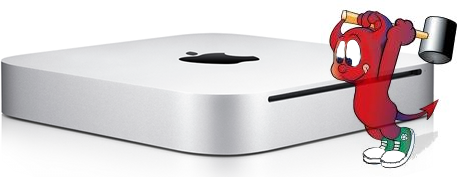*BSD onto a MacMini 4,1? No way. :-(

I spent the last two days trying to set up the Aluminium Mac Mini (rev. 4,1) as a home NAS server with encrypted storage, and I wanted a BSD system on it. There’s already an embedded OpenBSD onto the soekris gateway, and another companion would have been nice. :-)
Guess what, there’s no way out:
- FreeBSD 8.1 doesn’t complete the boot process, due to a bug in the SATA chipset, NV MCP89;
- FreeBSD 8.2-RC1 boots but, due to the same bug, doesn’t recognize any SATA drive nor any USB umass device;
- NetBSD 5.1 boots fine, handles SATA disks via the generic pciide driver (no DMA, thus quite slow) but, unluckily, doesn’t handle the BCM57762 ethernet controller. I tried with quick and dirty patches to bring the bge driver up to date with -current, but still no luck: the MII link detection works, the card transmits but doesn’t receive. The sdmmc controller as well works with -current but not with 5.1-RELEASE. ACPI works correctly;
- OpenBSD 4.8 boots, can access the SATA drives without DMA, and recognizes the bge network card, but exposes the very same behaviour as NetBSD 5.1 with the -current driver fitted in;
- DragonFlyBSD 2.8.2 doesn’t even enter kernel mode, I suspect due to ACPI bugs;
- PureDarwin didn’t inspire me too much, due to the many blocking issues.
All of them support encrypted storage, I built up a NetBSD CGD disk flawlessly onto dk wedges; FreeBSD has got the interesting gbde(8) and geli(8) GEOM-based tools that I wasn’t able to test, while OpenBSD supports crypto via a softraid personality. Unluckily, support for the, nowadays, exotic Apple hardware is a no-brainer.
So, with no other way left open, I decided to go the Linux route, using the excellent sysresccd, that I elect today as the successor of the pld-linux rescuecd, companion of endless system recoveries :-). Anyway, you’ll need the 2.6.36 kernel to make it boot onto the MacMini4,1, due to the aforementioned MCP89 bug. Ethernet card and SD card reader work out-of-the-box.
Now, I’m playing with LUKS and, while I’m not that competent in cryptography, looks like it is more evolved than the *BSD counterparts, and anyway it is more versatile tool than the tools in OpenBSD and NetBSD. On the latter, having to set up GPT and DK Wedges to make the CGD and synch MBR and Disklabel to make the boot loader work (yuck!), everything coupled with rEFIt is quite a mess™. There’s a GPT loader for NetBSD but I hadn’t a chance to try it out.
I hope this information is useful to anyone who tries a similar adventure, comments are appreciated :-).